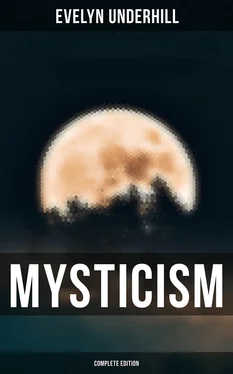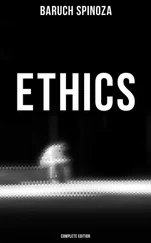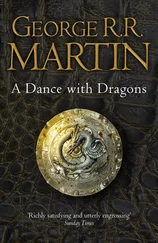Meanwhile, those who use the term “Mysticism” are bound in self-defence to explain what they mean by it. Broadly speaking, I understand it to be the expression of the innate tendency of the human spirit towards complete harmony with the transcendental order; whatever be the theological formula under which that order is understood. This tendency, in great mystics, gradually captures the whole field of consciousness; it dominates their life and, in the experience called “mystic union,” attains its end. Whether that end be called the God of Christianity, the World-soul of Pantheism, the Absolute of Philosophy, the desire to attain it and the movement towards it — so long as this is a genuine life process and not an intellectual speculation — is the proper subject of mysticism. I believe this movement to represent the true line of development of the highest form of human consciousness.
It is a pleasant duty to offer my heartiest thanks to the many kind friends and fellow students, of all shades of opinion, who have given me their help and encouragement. Amongst those to whom my heaviest debt of gratitude is due are Mr. W. Scott Palmer, for much valuable, generous, and painstaking assistance, particularly in respect of the chapter upon Vitalism: and Miss Margaret Robinson, who in addition to many other kind offices, has made all the translations from Meister Eckhart and Mechthild of Magdeburg here given.
Sections of the MS. have been kindly read by the Rev. Dr. Inge, by Miss May Sinclair, and by Miss Eleanor Gregory; from all of whom I have received much helpful and expert advice. To Mr. Arthur Symons my thanks and those of my readers are specially due; since it is owing to his generous permission that I am able to make full use of his beautiful translations of the poems of St. John of the Cross. Others who have given me much help in various directions, and to whom most grateful acknowledgments are here offered, are Miss Constance Jones, Miss Ethel Barker, Mr. J. A. Herbert of the British Museum — who first brought to my notice the newly discovered “Mirror of Simple Souls” — the Rev. Dr. Arbuthnot Nairn, Mr. A. E. Waite, and Mr. H. Stuart Moore, F.S.A. The substance of two chapters — those upon “The Characteristics of Mysticism” and “Mysticism and Magic” — has already appeared in the pages of The Quest and The Fortnightly Review. These sections are here reprinted by kind permission of their respective editors.
Feast of St. John of the Cross E. U. 1910
Table of Contents
“What the world, which truly knows nothing, calls ‘mysticism’ is the science of ultimates, . . . the science of self-evident Reality, which cannot be ‘reasoned about,’ because it is the object of pure reason or perception. The Babe sucking its mother’s breast, and the Lover returning, after twenty years’ separation, to his home and food in the same bosom, are the types and princes of Mystics.”
COVENTRY PATMORE,
“The Rod, the Root, and the Flower”
Chapter 1
The Point of Departure
Table of Contents
The most highly developed branches of the human family have in common one peculiar characteristic. They tend to produce — sporadically it is true, and often in the teeth of adverse external circumstances — a curious and definite type of personality; a type which refuses to be satisfied with that which other men call experience, and is inclined, in the words of its enemies, to “deny the world in order that it may find reality.” We meet these persons in the east and the west; in the ancient, mediaeval, and modern worlds. Their one passion appears to be the prosecution of a certain spiritual and intangible quest: the finding of a “way out” or a “way back” to some desirable state in which alone they can satisfy their craving for absolute truth. This quest, for them, has constituted the whole meaning of life. They have made for it without effort sacrifices which have appeared enormous to other men: and it is an indirect testimony to its objective actuality, that whatever the place or period in which they have arisen, their aims, doctrines and methods have been substantially the same. Their experience, therefore, forms a body of evidence, curiously self-consistent and often mutually explanatory, which must be taken into account before we can add up the sum of the energies and potentialities of the human spirit, or reasonably speculate on its relations to the unknown world which lies outside the boundaries of sense.
All men, at one time or another, have fallen in love with the veiled Isis whom they call Truth. With most, this has been a passing passion: they have early seen its hopelessness and turned to more practical things. But others remain all their lives the devout lovers of reality: though the manner of their love, the vision which they make to themselves of the beloved object varies enormously. Some see Truth as Dante saw Beatrice: an adorable yet intangible figure, found in this world yet revealing the next. To others she seems rather an evil but an irresistible enchantress: enticing, demanding payment and betraying her lover at the last. Some have seen her in a test tube, and some in a poet’s dream: some before the altar, others in the slime. The extreme pragmatists have even sought her in the kitchen; declaring that she may best be recognized by her utility. Last stage of all, the philosophic sceptic has comforted an unsuccessful courtship by assuring himself that his mistress is not really there.
Under whatsoever symbols they have objectified their quest, none of these seekers have ever been able to assure the world that they have found, seen face to face, the Reality behind the veil. But if we may trust the reports of the mystics — and they are reports given with a strange accent of certainty and good faith — they have succeeded where all these others have failed, in establishing immediate communication between the spirit of man, entangled as they declare amongst material things, and that “only Reality,” that immaterial and final Being, which some philosophers call the Absolute, and most theologians call God. This, they say — and here many who are not mystics agree with them — is the hidden Truth which is the object of man’s craving; the only satisfying goal of his quest. Hence, they should claim from us the same attention that we give to other explorers of countries in which we are not competent to adventure ourselves; for the mystics are the pioneers of the spiritual world, and we have no right to deny validity to their discoveries, merely because we lack the opportunity or the courage necessary to those who would prosecute such explorations for themselves.
It is the object of this book to attempt a description, and also — though this is needless for those who read that description in good faith — a justification of these experiences and the conclusions which have been drawn from them. So remote, however, are these matters from our ordinary habits of thought, that their investigation entails, in those who would attempt to understand them, a definite preparation: a purging of the intellect. As with those who came of old to the Mysteries, purification is here the gate of knowledge. We must come to this encounter with minds cleared of prejudice and convention, must deliberately break with our inveterate habit of taking the “visible world” for granted; our lazy assumption that somehow science is “real” and metaphysics is not. We must pull down our own card houses — descend, as the mystics say, “into our nothingness” — and examine for ourselves the foundations of all possible human experience, before we are in a position to criticize the buildings of the visionaries, the poets, and the saints. We must not begin to talk of the unreal world of these dreamers until we have discovered — if we can — a real world with which it may be compared.
Читать дальше












